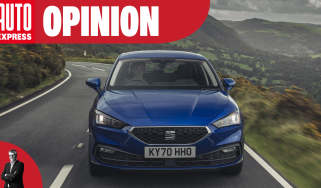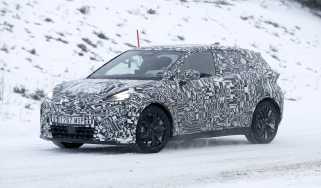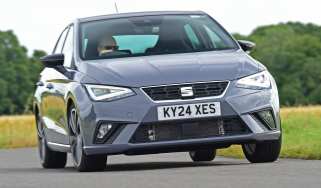SEAT electric car: latest on VW Group’s entry-level EV
A new all-electric SEAT could be in the works to keep the brand alive
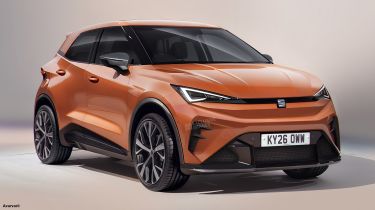
SEAT’s future has been in doubt recently. The growth of its more premium sibling, Cupra, combined with a lack of long-term plan for the Spanish brand led some to call its long-term existence into question. Volkswagen Group bosses had even started referring to SEAT as a ‘mobility brand’ rather than a conventional car manufacturer. There is still hope for SEAT, however, as it could launch an all-electric car in the coming years.
At SEAT SA’s annual media conference in Barcelona, CEO Wayne Griffiths was adamant that SEAT will live on, confirming plans for electrification. “We will continue to invest in SEAT. When the time is right there will be an electric SEAT - right now isn’t the time”, Griffiths said.
He also called into question the reporting of the death of SEAT, “for us, it was always clear that the brand was not going to disappear. Why would you let a brand that has existed for 73 years disappear?”
During the conference, Griffiths announced the lifespans of the Leon and Arona would be extended with new facelifts coming in 2025. He also claimed that SEAT’s financial health was “more alive than ever”. This was followed by an apparent confirmation the SEAT is looking into an affordable all-electric car, “for me it's natural that in the future there will be an entry-model electric car for SEAT.”
Auto Express broke the story on an all-electric SEAT 18 months ago, revealing that while the VW Group already has the likes of the Volkswagen ID.2 and Cupra Raval in the works – with projected price tags of around £23,000 – there is a further development unit aiming to deliver another zero-emissions car that can match ICE cars like the Skoda Fabia and SEAT Ibiza for value.
The project is being led by Skoda, which has a history of ‘owning’ base-level technical solutions within the group, such as the 1.0-litre MPI engine that powered cars including the VW up!, Skoda Citigo and SEAT Mii city car siblings. Skoda boss Klaus Zellmer told us at the time, “We’re tasked to find the right solution for the easiest access into the VW Group.”
Gossen was quick to dismiss any suggestion that SEAT could be developed into a cut-price value brand, as the Renault Group has done with Dacia. And that’s likely to mean that SEAT could tap into VW’s ambitious project to develop an affordable all-electric model that can be sold for less than £20,000.
Our exclusive images show how a baby SEAT electric car could look – although the headline-grabbing £17,000 versions will almost certainly eschew body-coloured plastics on some of the bumpers and door mirrors.
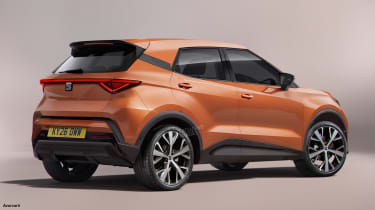
No technical details are available yet, but our images reflect an expectation that the car will be a supermini-sized vehicle with a smaller battery, instead of a circa-3.7m-long city car – not least because this will allow engineers to tap into the economies of scale from models such as the ID.2. Using a version of the MEB Entry platform that will underpin the Volkswagen ID.2all and Cupra Raval, there’s a possibility to fit a battery pack of around 38kWh, using less energy-dense but cheaper-to-produce lithium-iron phosphate chemistry.
At last year’s SEAT and Cupra conference, global boss Wayne Griffiths said: “We can’t electrify both brands at once. SEAT and Cupra complement each other during the transition phase.” He insisted: “We don’t need to decide the future of SEAT today.”
Despite reports of SEAT’s demise, the maker posted strong UK sales in 2023. Gossen joined the business in October and led both brands to positive end-of-year numbers, pushing SEAT to 32,177 registrations – up 45 per cent year on year – and Cupra to 25,658 cars, up 78 per cent.
His goal is to increase SEAT and Cupra’s combined market share from where they stand currently, at three per cent, to five per cent, helped by an increase in retailer numbers. However, he doesn’t expect Cupra sales to overtake those of SEAT, instead balancing out at “about 50:50” in 2024.
Aside from the possibility of an entry-level EV, there are currently no plans for any other new SEAT models to be launched. Instead the company will continue to focus on the existing range of petrol and plug-in hybrid models – the Ibiza, Leon, Arona, Ateca and Tarraco.
Cupra, on the other hand, will be adding to its five-strong line-up this year, with the Tavascan EV and Terramar plug-in hybrid, both set to join the range in 2024.
Click here for our list of the cheapest electric cars on sale...
Find a car with the experts


